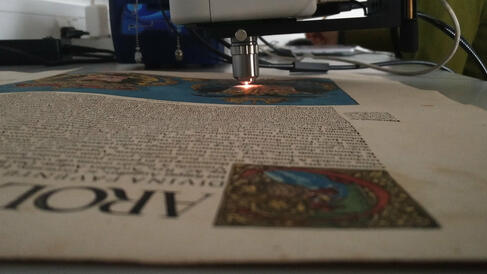The Cambridge Heritage Science Hub (CHERISH)

The Cambridge Heritage Science Hub (CHERISH) Initiative
Dr Paola Ricciardi, Fitzwilliam Museum & Professor Marcos Martinón-Torres, Dept of Archaeology/McDonald Institute
Cambridge is home to world-leading researchers across Technical Art History, Heritage Science and Archaeological Science, based at the Fitzwilliam Museum, the Hamilton Kerr Institute and the Department of Archaeology/McDonald Institute for Archaeological Research. There are multiple synergies across the three institutions in terms of research methodologies, goals and ambitions in the field of technical and scientific investigation of works of art and archaeological objects. We are therefore developing a connected research community for Archaeological and Heritage Science in Cambridge, which takes full advantage of our collective strengths.
Building on multiple joint projects already underway, the Cambridge Heritage Science Hub (CHERISH) Initiative supports the development of partnerships and collaborative projects and ultimately aims to embed partnership-focused working in the area of Archaeological and Heritage Science across a large number of institutions, including not only the three mentioned so far, but also Cambridge University Library (CUL), the other University of Cambridge Museums (UCMs) and the Department of History of Art (HoA).
At the core of this initiative is our conviction that scientific approaches are key to the characterisation, preservation, understanding and dissemination of heritage but also that these studies should be grounded in the broader intellectual frameworks of the arts and humanities, in order to maximise benefits to communities, economies and the environment. We promote a critical approach to archaeological and heritage science that is both robust in its scientific foundations and humanistic in its engagement with artefacts, people and their multifaceted cultural and natural contexts.
We expect this endeavour to generate productive areas of inquiry that cross the current research interests at the different institutions; and to streamline the shared use of existing as well as future facilities for Archaeological Science, Conservation and Heritage Science. In doing so, we are putting structures in place for the full development of Archaeological and Heritage Science at Cambridge, including through increased grant capture and philanthropic donations, and for its national and international advocacy, through our contribution to the work of the National Heritage Science Forum (NHSF) and to the ongoing AHRC push for Heritage Science Infrastructure and initiatives.
Dr Paola Ricciardi is the Fitzwilliam Museum's Senior Research Scientist. Before joining the Fitzwilliam Museum in October 2011, she spent three years at the National Gallery of Art in Washington DC as the Samuel H. Kress post-doctoral Fellow in Imaging Science. At the Fitzwilliam, Paola is responsible for the scientific aspects of the MINIARE research project (www.miniare.org), which uses a cross-disciplinary approach to study medieval and Renaissance illuminated manuscripts. She is also engaged in research on medieval polychrome wood sculptures, early Modern portrait miniatures, and 18th century ceramics and glass. Paola’s main research interests include the technical analysis of cultural heritage objects, particularly with non-invasive imaging and spectroscopic methods; the study of artists’ materials and techniques; and the transfer of knowledge between artists and craftsmen working in different media.
Professor Marcos Martinón-Torres is the Pitt-Rivers Professor of Archaeological Science. He joined the Department of Archaeology in Cambridge in 2018, after over a decade at UCL. He has a background in history, archaeology and archaeological science. Much of his research focuses on the analysis of material culture and the reverse engineering of archaeological technologies, as a starting point to understand the evolution and movement of knowledge, people and things. He is very fond of collaborative and exploratory research, and greatly enjoys teaching.
